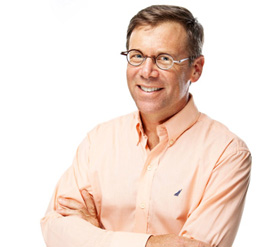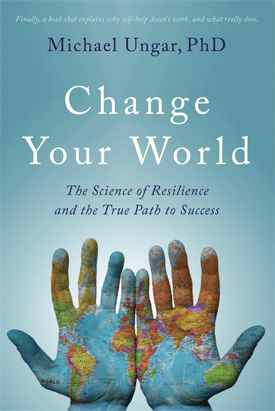With his new book Change Your World: The Science of Resilience and the True Path to Success, Michael Ungar is challenging misconceptions around the worlds of self-help and resilience.
Dr. Ungar, professor in the School of Social Work and a Canada Research Chair, is the director of the at ╗Ų╔½ų▒▓ź, which studies resilience around the world.
 ŌĆ£The idea of the book was to take what weŌĆÖre studying on a global scale and adapt it for a more popular audience to really challenge this mythic notion of the self-help industry,ŌĆØ says Dr. Ungar (pictured).
ŌĆ£The idea of the book was to take what weŌĆÖre studying on a global scale and adapt it for a more popular audience to really challenge this mythic notion of the self-help industry,ŌĆØ says Dr. Ungar (pictured).
ŌĆ£When you say resilience, you're looking at how you can explain why people are doing better than expected when they are experiencing adversity or stress that is not typical in our lives. You try and understand the protective aspects of peopleŌĆÖs lives. YouŌĆÖre asking, ŌĆśWhat are the mechanisms, the processes that make it more likely that theyŌĆÖre going to do well under a lot of stress and adversity?ŌĆÖŌĆØ
The book challenges what Dr. Ungar considers a ŌĆ£mythical ideaŌĆØ: the rugged individual that overcomes adversity through their own innate qualities.
ŌĆ£The science really doesnŌĆÖt say that. ItŌĆÖs a popular idea because people like to believe that their lives are under their own control, even though thatŌĆÖs not entirely true.ŌĆØ
Dr. Ungar is hosting a book launch and lecture at the Halifax Central Library this Thursday evening (June 13) at 6:30 p.m.
The limits to ŌĆ£self-helpŌĆØ
According to Dr. Ungar, people often try to ŌĆ£tough it outŌĆØ through bad situations instead of making things easier by changing their environment.
ŌĆ£If you are emphasizing self-help, then the implicit notion is that if you donŌĆÖt do well, itŌĆÖs just because you werenŌĆÖt motivated,ŌĆØ he says. ŌĆ£ŌĆÖYou didnŌĆÖt put enough energy into your meditation practice,ŌĆÖ or, ŌĆśyou just didnŌĆÖt take enough steps.ŌĆÖ
ŌĆ£The science of resilience is beginning to understand that what makes us resilient isnŌĆÖt just whatŌĆÖs inside of us, and that self-help Is a dead-end street in that regard. ItŌĆÖs really more about creating environments around us that will bring out our best.ŌĆØ
With Change Your World, Dr. Ungar hopes to help those in crisis realize that their situations are not entirely their fault.
ŌĆ£ItŌĆÖs safe to say that people who would probably pick up the book are those who are frustrated with their perceived inability of not being able to succeed using the self-help methods that are promoted and are looking for a different conversation.ŌĆØ
Moving the focus to the environments
He recalls an experience speaking at a nursesŌĆÖ conference a few years ago, after which one of the attendees found him after his talk. ŌĆ£She said, ŌĆśMy bosses send us to these things and weŌĆÖre told to meditate. I donŌĆÖt want to meditate! IŌĆÖve got a stressful job, and frankly IŌĆÖd rather if theyŌĆÖd just put more nurses on duty and change our schedules and change a few other things.ŌĆÖŌĆØ
 Stories like this arenŌĆÖt unique, according to Dr. Ungar. ŌĆ£WhatŌĆÖs been interesting about watching the comments online where the bookŌĆÖs been appearing and people affirming that they knew the self-help stuff wasnŌĆÖt working. They knew it, but nobody was voicing it. They didnŌĆÖt have the language to express ŌĆśsomethingŌĆÖs not right, maybe itŌĆÖs just me.ŌĆÖ
Stories like this arenŌĆÖt unique, according to Dr. Ungar. ŌĆ£WhatŌĆÖs been interesting about watching the comments online where the bookŌĆÖs been appearing and people affirming that they knew the self-help stuff wasnŌĆÖt working. They knew it, but nobody was voicing it. They didnŌĆÖt have the language to express ŌĆśsomethingŌĆÖs not right, maybe itŌĆÖs just me.ŌĆÖ
ŌĆ£Guess what? ThereŌĆÖs plenty of research to say why itŌĆÖs not you. ItŌĆÖs actually that you are not the problem ŌĆö the environment around you is conspiring to make this not work very well for you.ŌĆØ
Making the right changes
He says that no matter how difficult it can seem to change our environment, there are always small practices you can institute to improve your resilience.
ŌĆ£IŌĆÖll often say an example that I love: the birthday person,ŌĆØ Ungar explains. ŌĆ£A lot of work teams have the birthday person, one person on the team that remembers everybody elseŌĆÖs birthday. And they have that job to bring in the cake or donuts. They make sure that someone is keeping track of everyone elseŌĆÖs well-being.
ŌĆ£These small efforts that somebody does are often what convey to us that we matter, that weŌĆÖre embedded, that we have a culture, we have a space to be, that weŌĆÖre treated fairly and socially justly. All these small incremental things are cumulative and they add up to making us do well.ŌĆØ
Change Your World: The Science of Resilience and the True Path to Success is out now from Sutherland House Press. Dr. UngarŌĆÖs book launch and lecture takes place at the Halifax Central Library Thursday evening (June 13) at 6:30 p.m. in the Lindsay ChildrenŌĆÖs Room.

